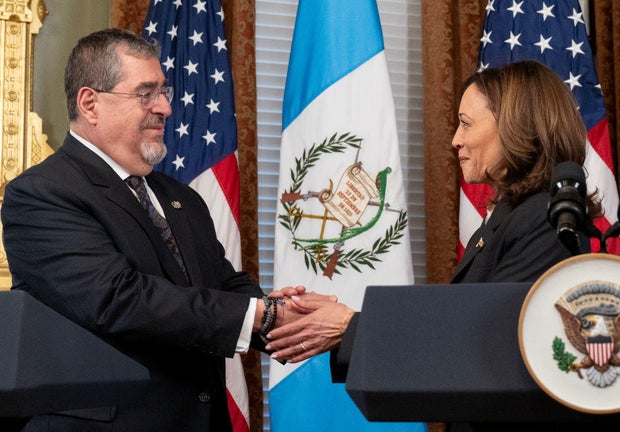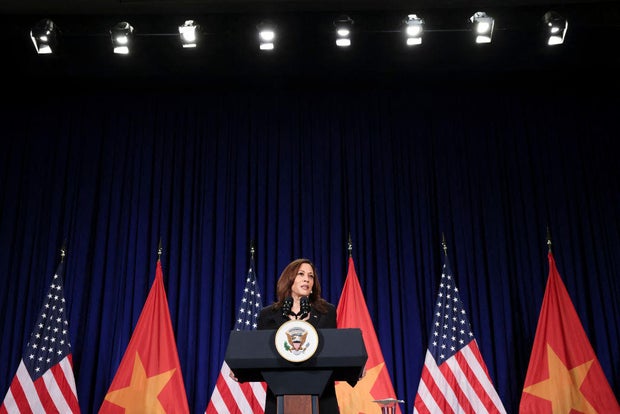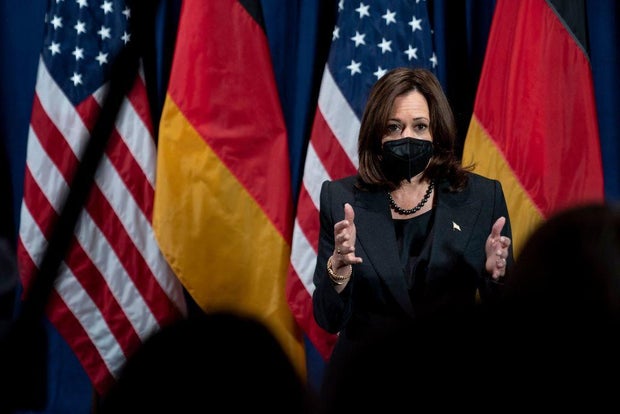After President Biden announced he would not be running for reelection, he endorsed Vice President Kamala Harris as his pick to become the Democratic nominee. Here’s a look at some of Harris’ work on foreign policy over the last three and a half years:
The U.S. border and immigration from South and Central America
Harris was assigned early during the Biden administration with addressing the “root causes” of irregular migration to the United States across its border with Mexico. She described those causes as corruption and lack of economic opportunity in some Central and South American nations.
She has traveled to Latin America twice as vice president: To Mexico and Guatemala in 2021, and to Honduras in 2022.
During a speech In Guatemala, she told people in the region considering making an unauthorized trip across the border: “Do not come. Do not come. The United States will continue to enforce our laws and secure our borders.”
In Mexico, she announced the U.S. would be investing millions of dollars in a bid to enhance worker protections and push for labor reforms there. She also announced commitments to foster investment in Mexico through things including loans for affordable housing.
Harris also announced a joint partnership with Mexico to foster economic opportunities in Honduras, Guatemala and El Salvador through agriculture and youth empowerment. In March, the White House announced she had secured private sector commitments to invest $5 billion towards the promotion of economic opportunities and the reduction of violence in the region.
China, Taiwan and the South China Sea
Harris has largely carried the White House’s message on the challenges presented by China, speaking on several occasions about curbing Chinese influence.
“We know that Beijing continues to coerce, to intimidate and to make claims to the vast majority of the South China Sea,” Harris said in a speech during a seven day trip to Singapore and Vietnam in 2021.
“Beijing’s actions continue to undermine the rules-based order and threaten the sovereignty of nations,” she said. The United States stands with our allies and partners in the face of these threats.”
In 2022, Harris said that the U.S. would “continue to support Taiwan’s self defense, consistent with our long-standing policy.”
Harris’ visit to Singapore — a close U.S. ally that’s home to a key U.S. Navy base in Southeast Asia — followed visits by Secretary of State Antony Blinken and Secretary of Defense Lloyd Austin to Asia in the previous weeks. The Biden administration was eager to reassure Asian allies nervous about China’s assertive policies in the region, especially in the wake of the chaotic U.S. military withdrawal from Afghanistan.
“The reason I am here is because the U.S. is a global leader, and we take that role seriously,” said Harris. She stressed what she called the United States’ “enduring engagement” in Asia, hitting on previous administration talking points about ensuring an “open and free” Indo-Pacific region, and “freedom of navigation” in the South China Sea.
NATO, Europe and Russia’s war on Ukraine
Harris has voiced clear support for Ukraine as it continues fighting to repel Russia’s ongoing invasion, and she has reiterated the U.S. commitment to the transatlantic NATO alliance with America’s European partners.
Earlier this year, she vowed the U.S. would support Ukraine’s fight for “as long as it takes.”
At the Munich Security Conference in 2022, Harris said the U.S. had “an unwavering commitment to NATO and to the Alliance.”
The meeting came as Russia massed hundreds of thousands of troops along Ukraine’s border, just days before it launched its full-scale invasion.
“America’s commitment to Article 5 is ironclad,” Harris said in 2022, referring to the mutual defense clause in the NATO charter that calls for an attack on any member to be treated as an attack on all. “This commitment is sacrosanct to me, to President Biden and to our entire nation.”
The Israel-Hamas war and the wider Middle East
Harris has said that she supports Israel’s right to defend itself, but also that “as Israel defends itself, it matters how.”
In a briefing in December 2023, Harris said that “as Israel pursues its military objectives in Gaza, we believe Israel must do more to protect innocent civilians.”
She said that she and the president remained committed to the goal of a two-state solution.
“When this conflict ends, Hamas cannot control Gaza, and Israel must be secure. Palestinians need a hopeful political horizon, economic opportunity and freedom. And the region, more broadly, must be integrated and prosperous. And we must — we must work toward that vision,” Harris said.
Josh Paul, a former director at the U.S. State Department’s Bureau of Political Military Affairs, told CBS News on Monday that Harris could look to distinguish herself at least slightly from Mr. Biden’s policy toward Israel. Paul resigned in October over the Biden administration’s decision to continue providing Israel with weapons as it launched military operations in Gaza.
He said Harris had been “the first and often the loudest voice within the Biden administration talking about the need for a cease-fire, talking about Palestinian humanitarian issues and, frankly, humanizing the Palestinians,” adding that he believed there was “room for some degree of optimism that as president, she will take a different path.”
“I certainly wouldn’t expect a Harris administration to walk away, in any way, from the U.S.’, you know, ironclad support for Israel,” he said.
He added that, in his opinion, Mr. Biden has found it “very hard to change his mind on things that were, you know, fixed within his perceptions,” and he said Harris could prove “to be a more pragmatic” leader if she gets the nation’s top job.
Emmet Lyons contributed to this report.



